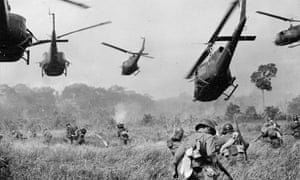30 April 1970: The American Command in Vietnam confirms that it provided military support for “counter attacks against North Vietnamese and Vietcong forces”
Ian Wright
Thu 30 Apr 2020
G

US Army helicopters cover the advance of South Vietnamese ground troops as they attack a Vietcong camp near the Cambodian border, 1965. Photograph: Horst Faas/Associated Press
Saigon, April 29
South Vietnam admitted for the first time tonight that its troops have crossed over into Cambodia – and with United States military support – to “destroy enemy bases along the border” in the Parrot’s Beak area.
Soon after this was announced in a communique from the South Vietnamese Defence Ministry, the American Command in Vietnam confirmed that, with the advance approval of Washington, it had been involved in today’s operation. US air, logistical, medical, and artillery support were provided, and it appears that American advisers accompanied the troops on what the Command described as “counter attacks against North Vietnamese and Vietcong forces.”
The Parrot’s Beak, a Cambodian salient less than forty miles west of Saigon, has long been a convenient Communist base area. Earlier this month heavy fighting was reported there as North Vietnamese and Vietcong units clashed with the Cambodian Army. South Vietnamese troops were then seen on the other side of the border, though official sources here denied they had been there.
According to today’s American statement, the Vietnamese at first provided their own helicopters, artillery, and tactical air strikes to support their troops. The statement gives the impression that the US help was asked for only later in the operation.
It claims that the Americans provided supplementary support to “help to save the lives of free world forces and help achieve South Vietnamese objectives.” Meanwhile, from the Vietnamese communique, the operation appears to be a raid in force rather than a move to occupy Cambodian territory – at least for the time being.
Nixon address
Richard Scott writes from Washington: Tomorrow evening President Nixon is to address the nation on the nature and extent of US military aid to Cambodia. But the Pentagon has already confirmed that America is providing advisers and other military support for the South Vietnamese in their raids there.
The Pentagon said that the US support for such forays “will take the form of advisers, tactical air support, air coordinators, medical evacuation and some logistics assistance” – almost everything short of American ground combat units. This support is thus comparable to that which Washington provided for South Vietnam before the entry of American combat units in March, 1963. By 1968 there were half a millions American troops in the country.
Although the new US aid goes directly to South Vietnamese rather than Cambodian units, the latest statement has to be regarded as part of the American reply to Cambodia’s request for military aid. The White House spokesman, however asserted that it should not be regarded as constituting the US reply; so presumably Mr Nixon will disclose further decisions regarding this when he addresses the nation.
The South Vietnamese units not operating in Cambodia will be virtually American mercenaries fighting for an admitted American interest for which American ground troops may not themselves fight for political reasons, both internal and external. But this, to some extent, indirect American military intervention in Cambodia is unlikely to go without reaction by Hanoi. Some observers in Washington expect that it will lead to an intensification of the North Vietnamese-Vietcong offensive – perhaps to their capture of Phnom Penh and the reinstatement of the ousted Prince Sihanouk.
The signs are that Mr Nixon has decided to go farther than most observers had expected in aiding the Cambodians. What is found to stick most in people’s throats in Washington is the provision of advisers.

No comments:
Post a Comment